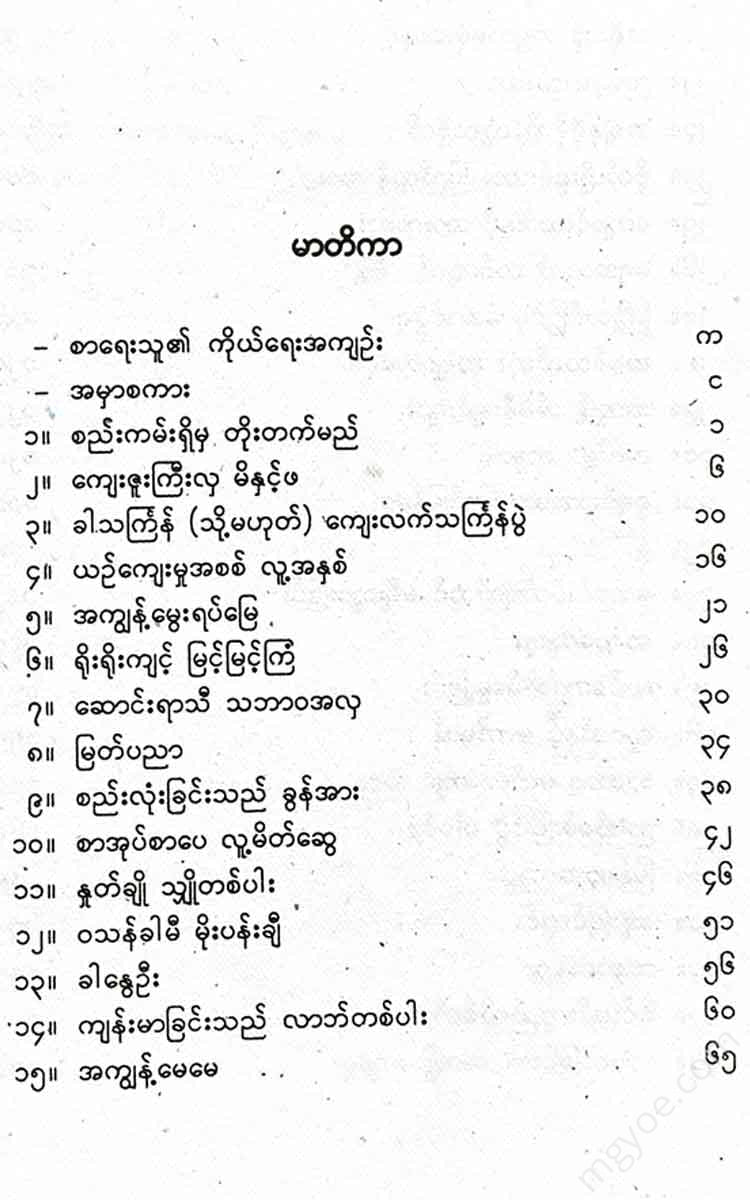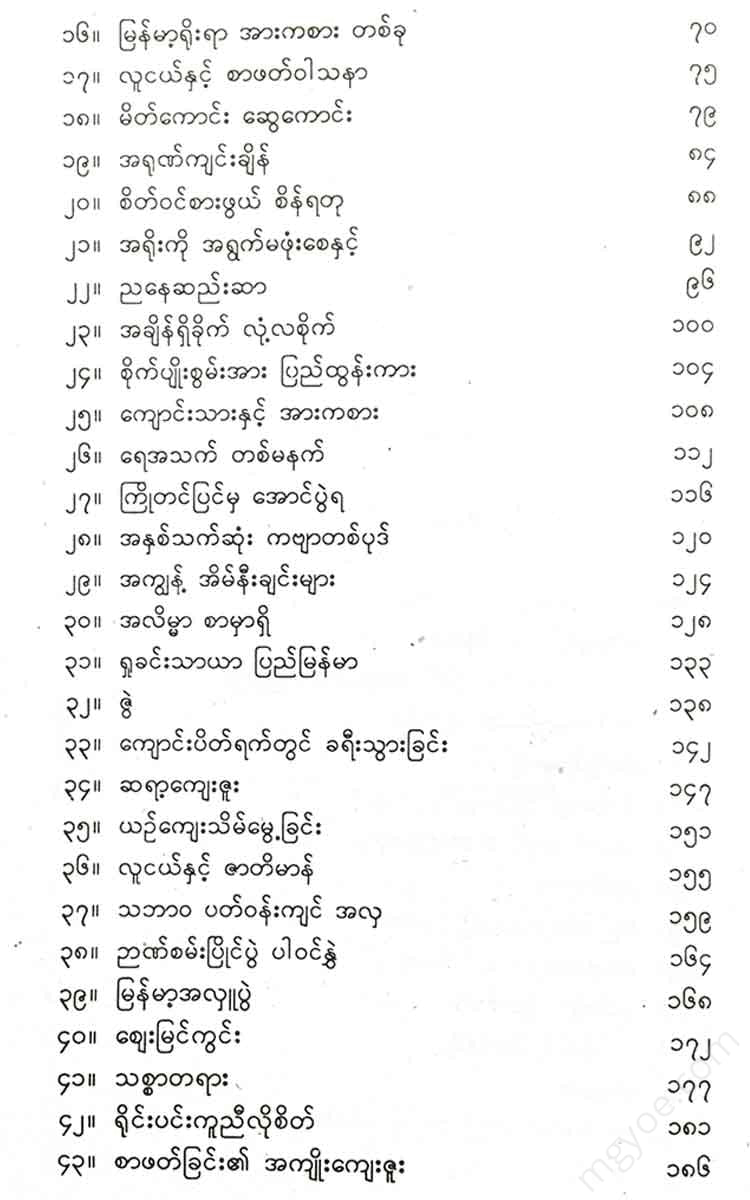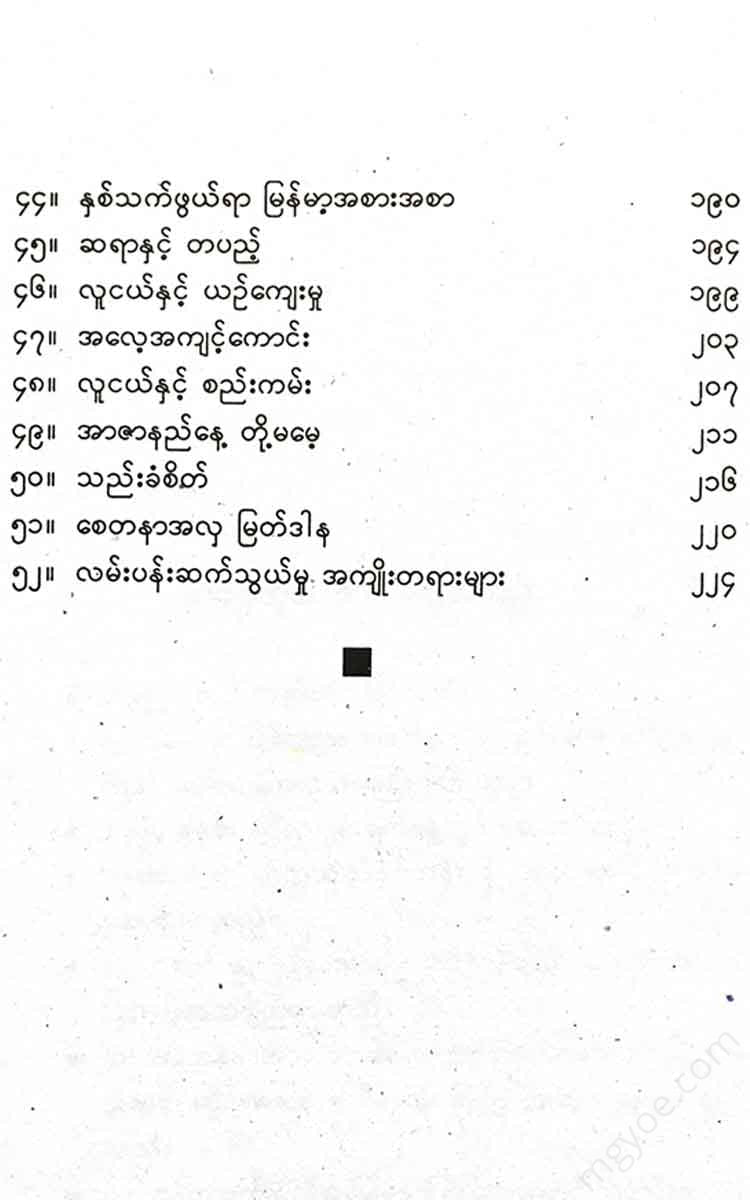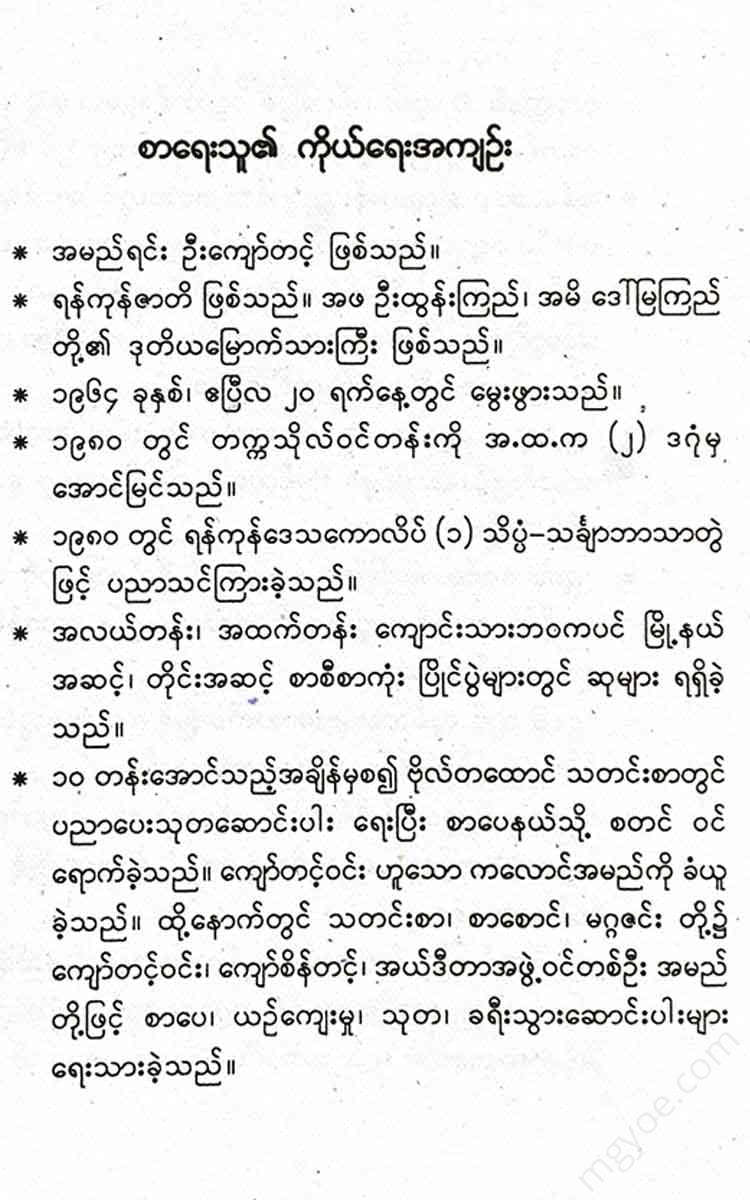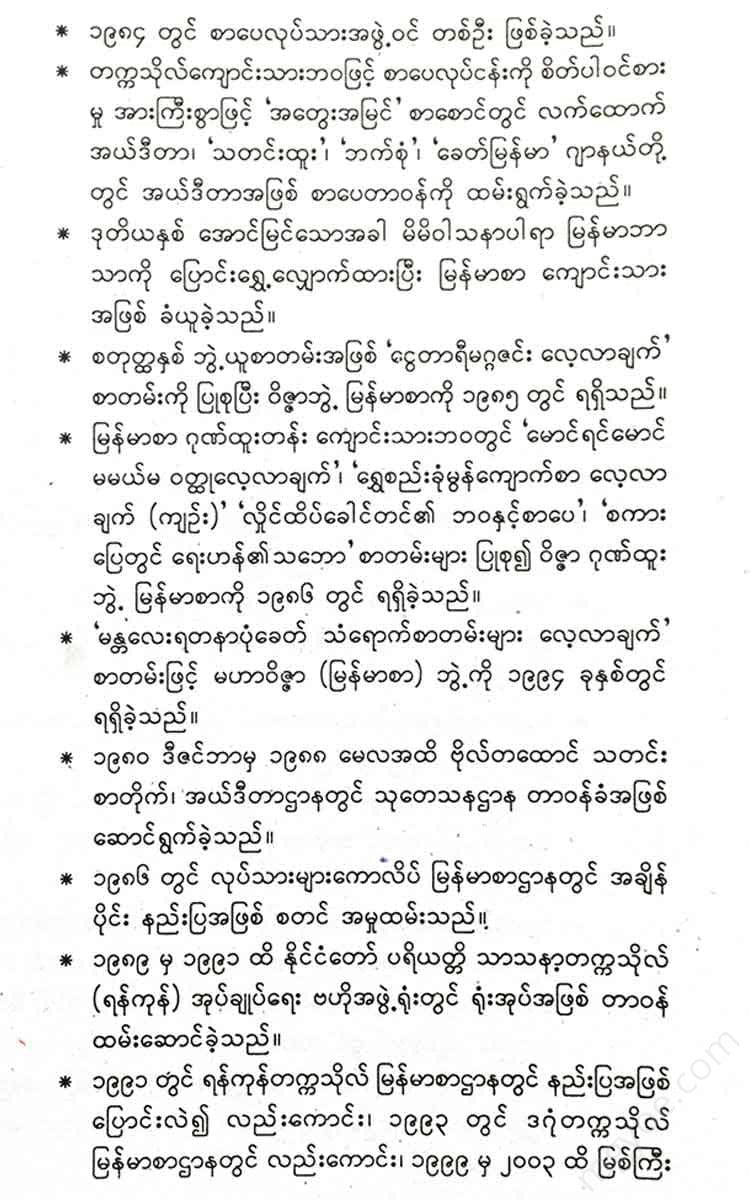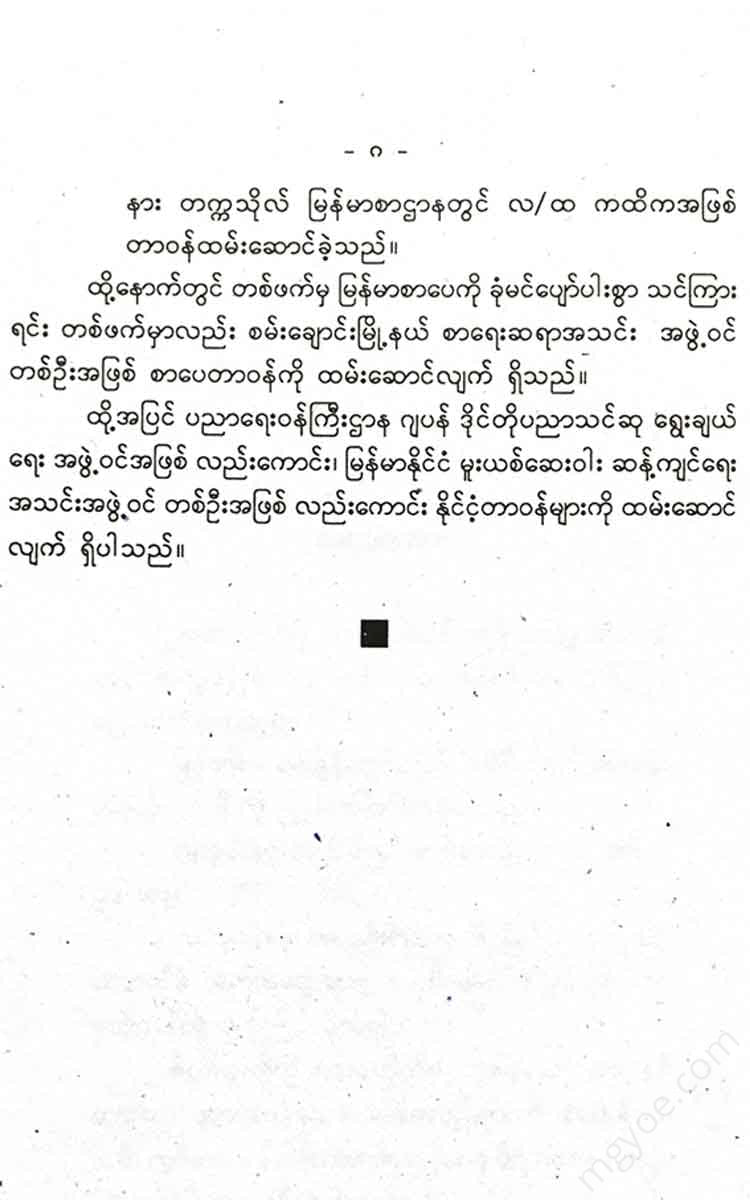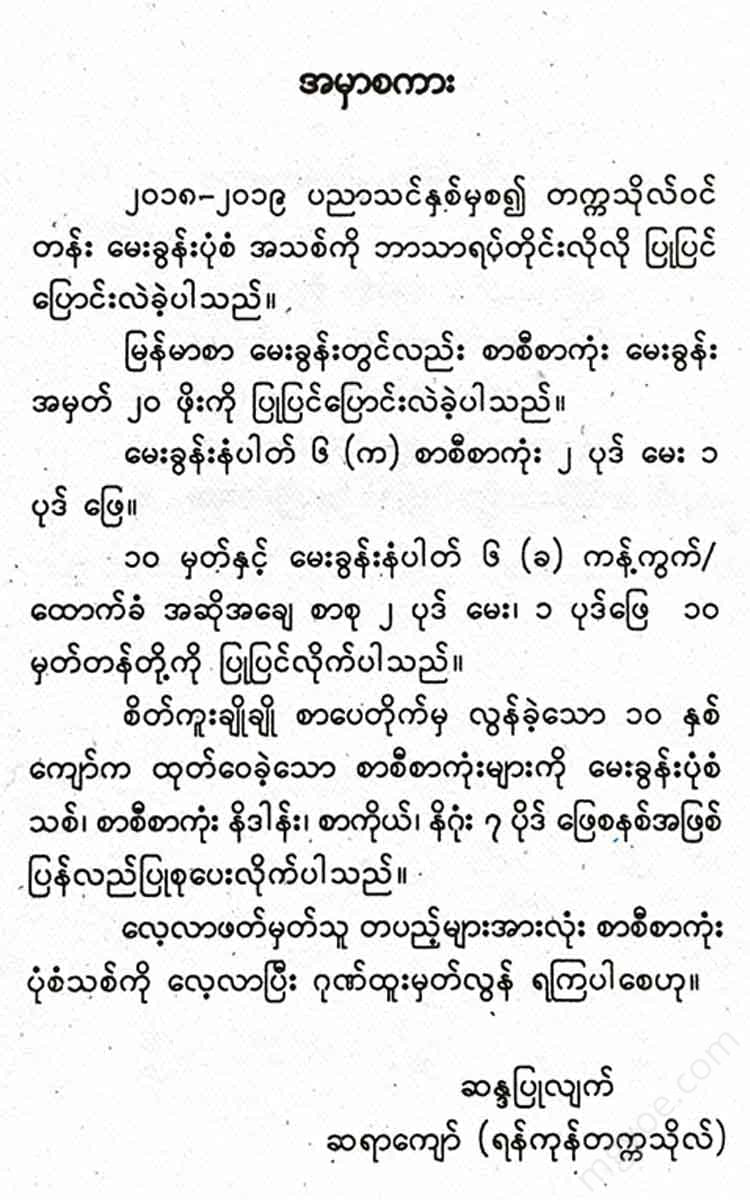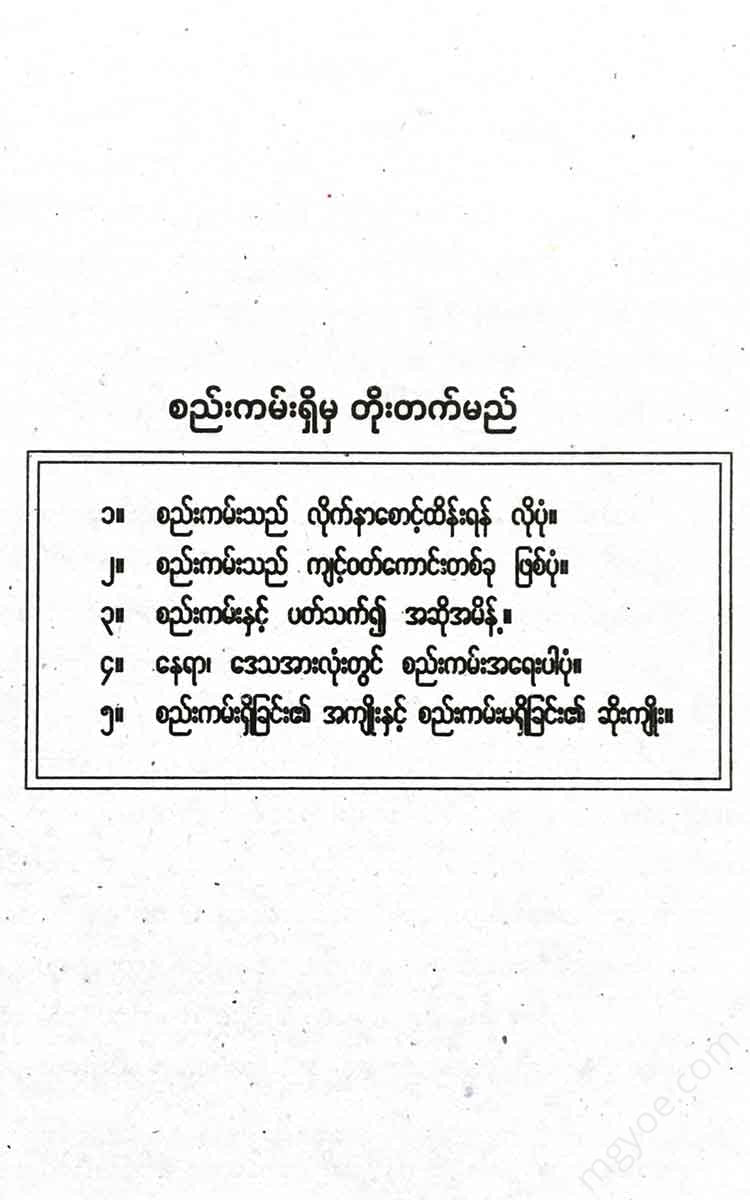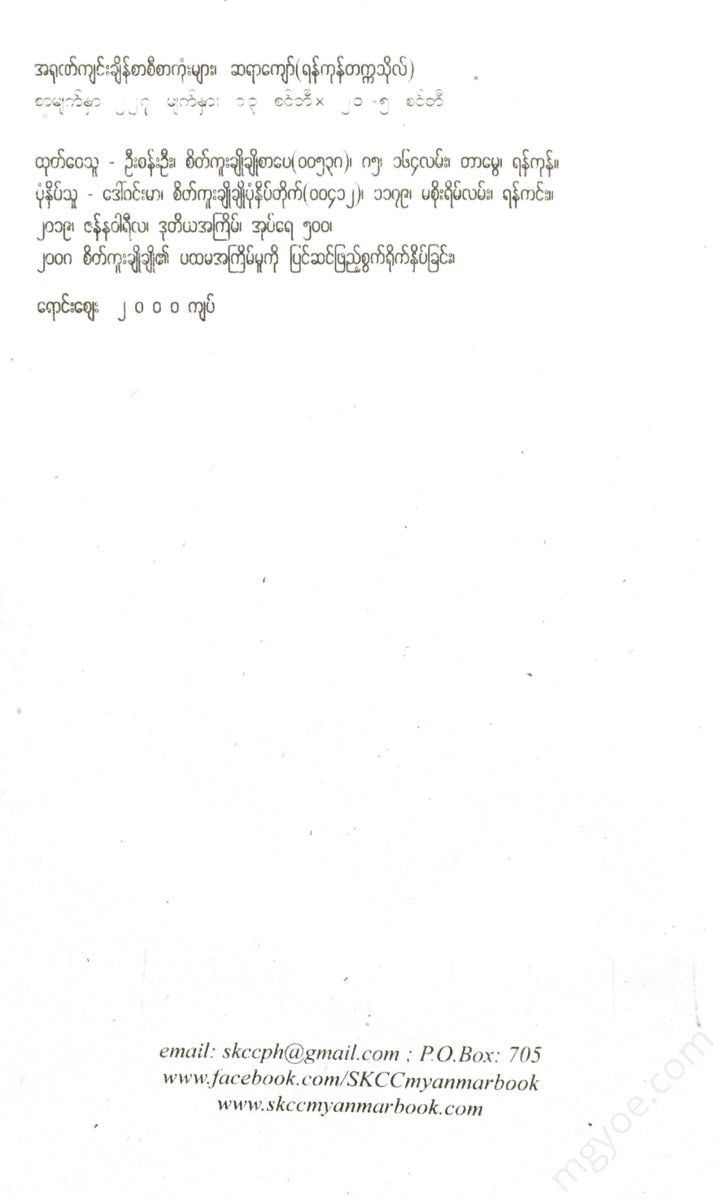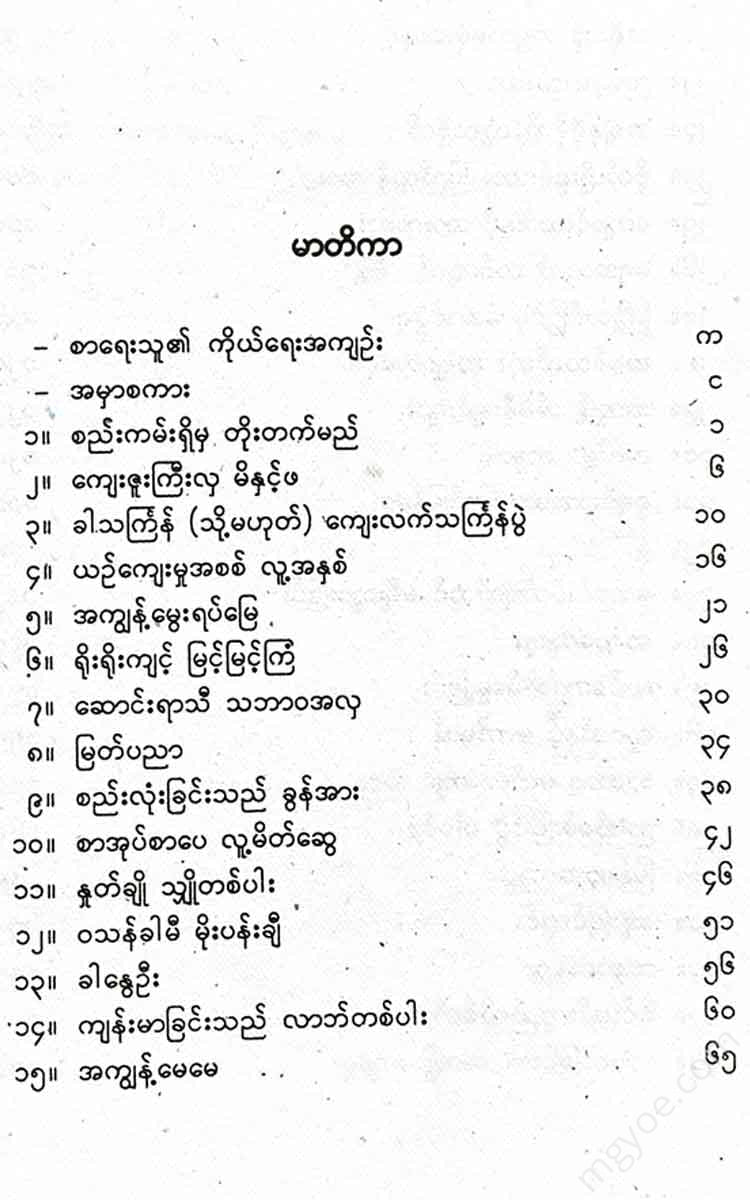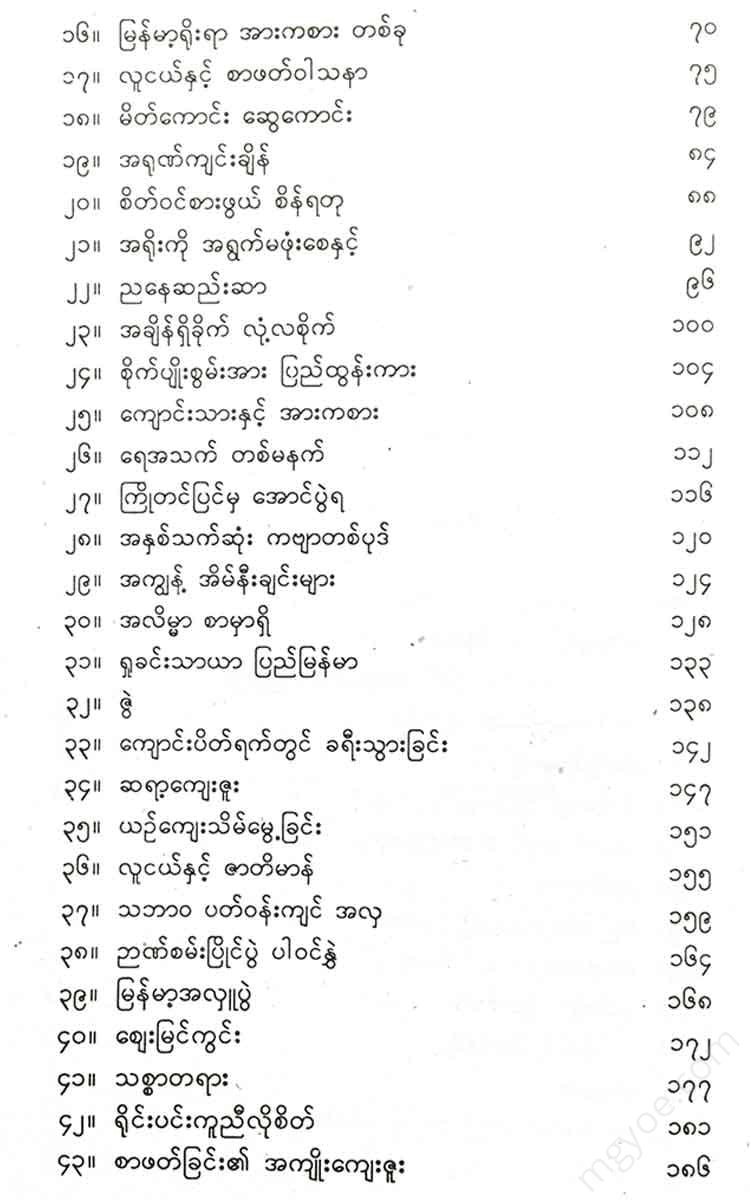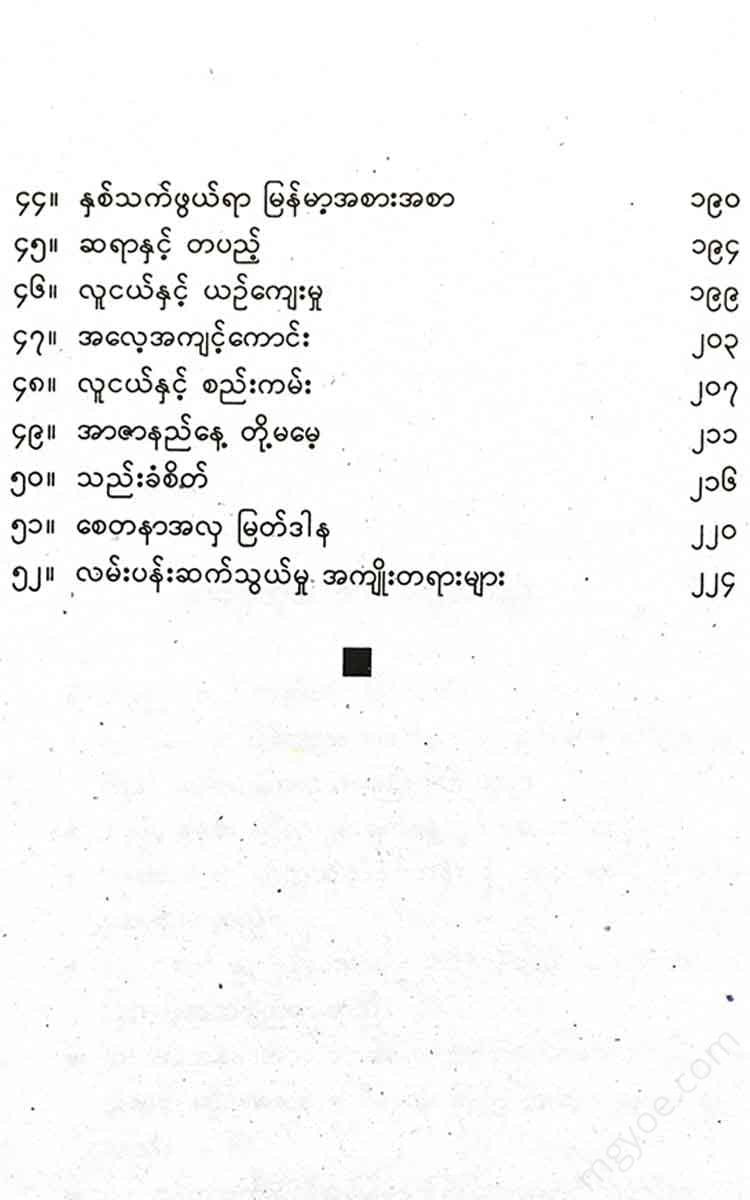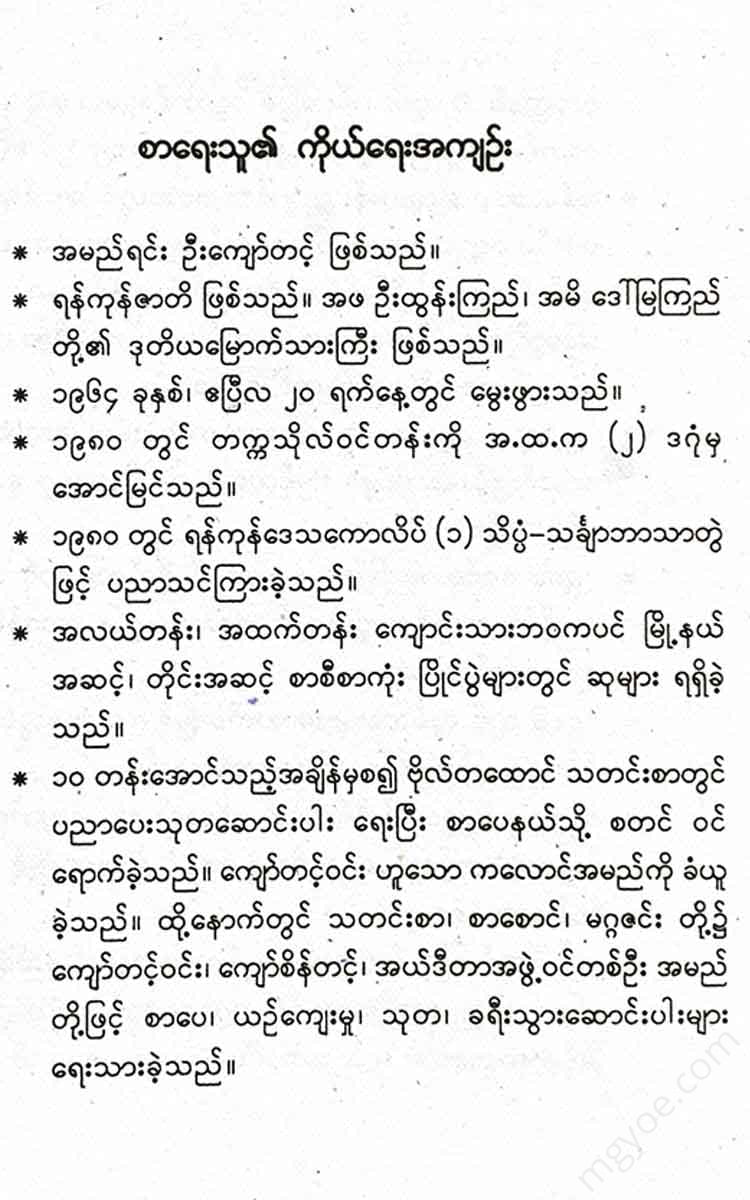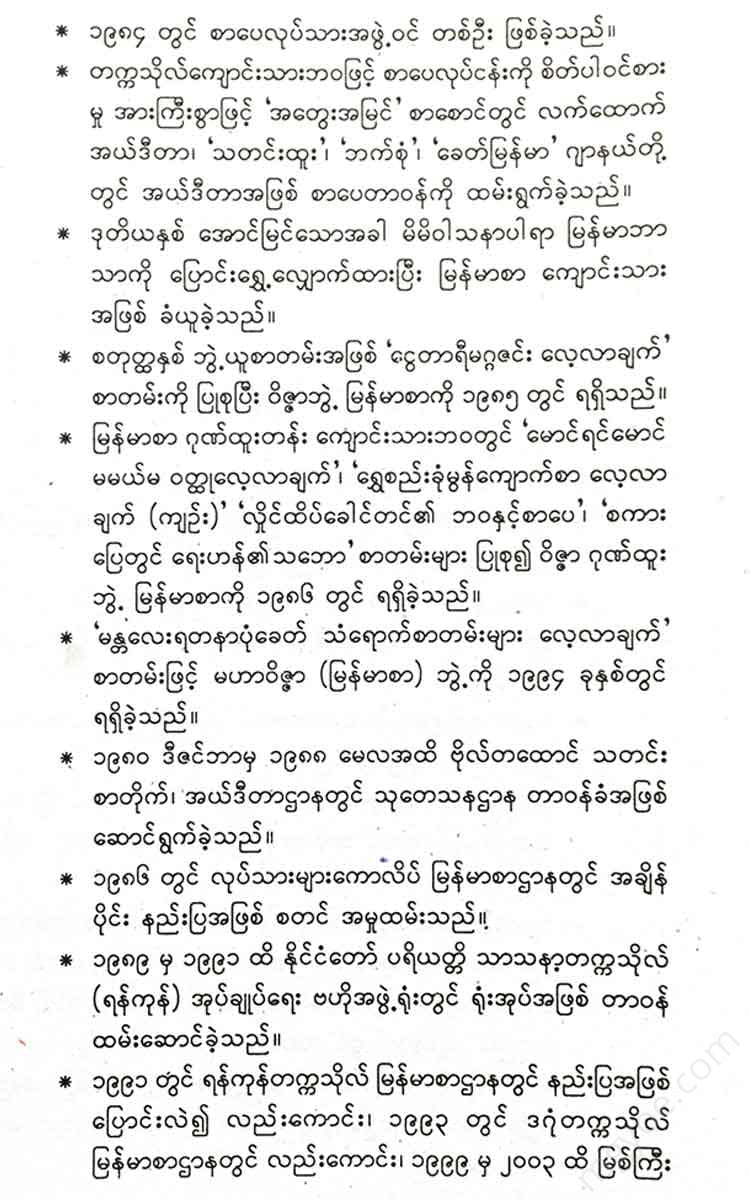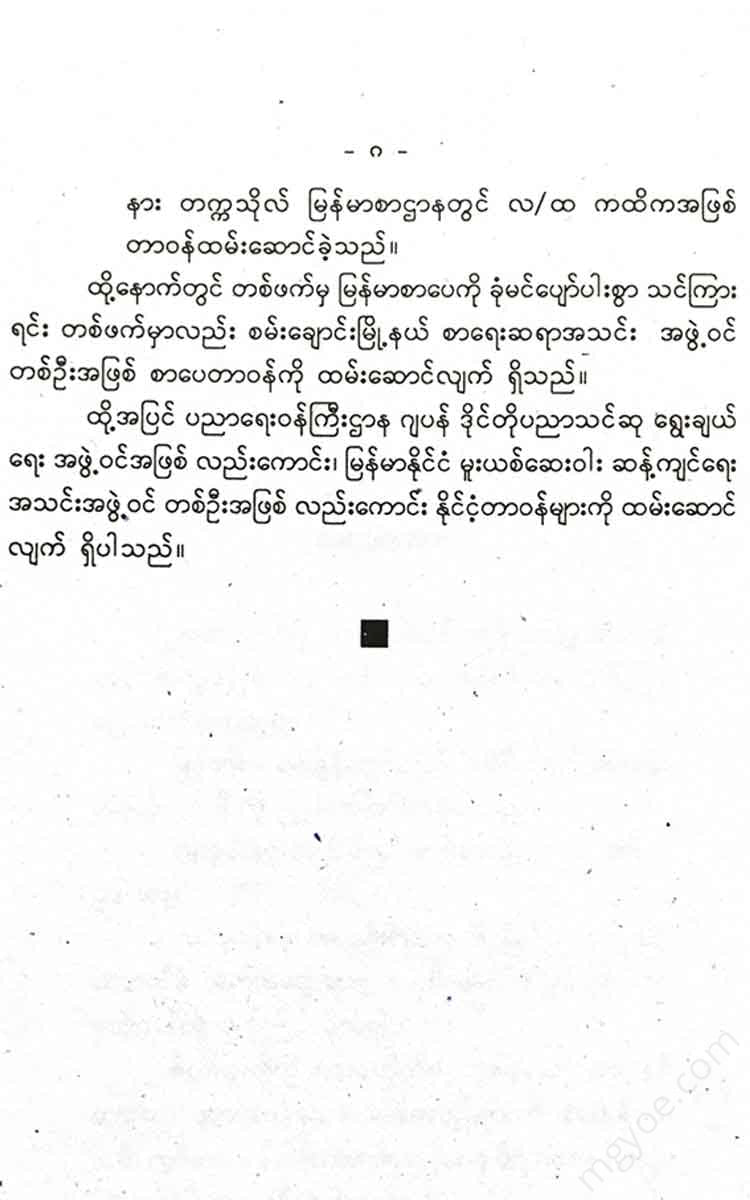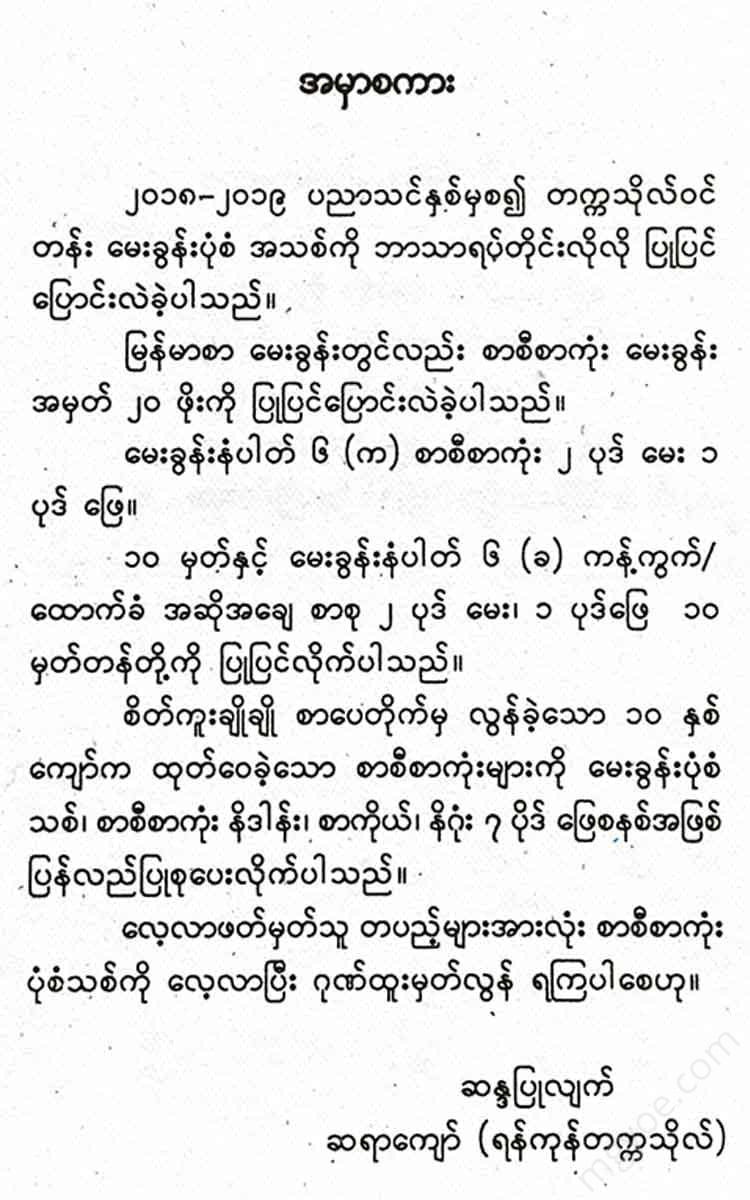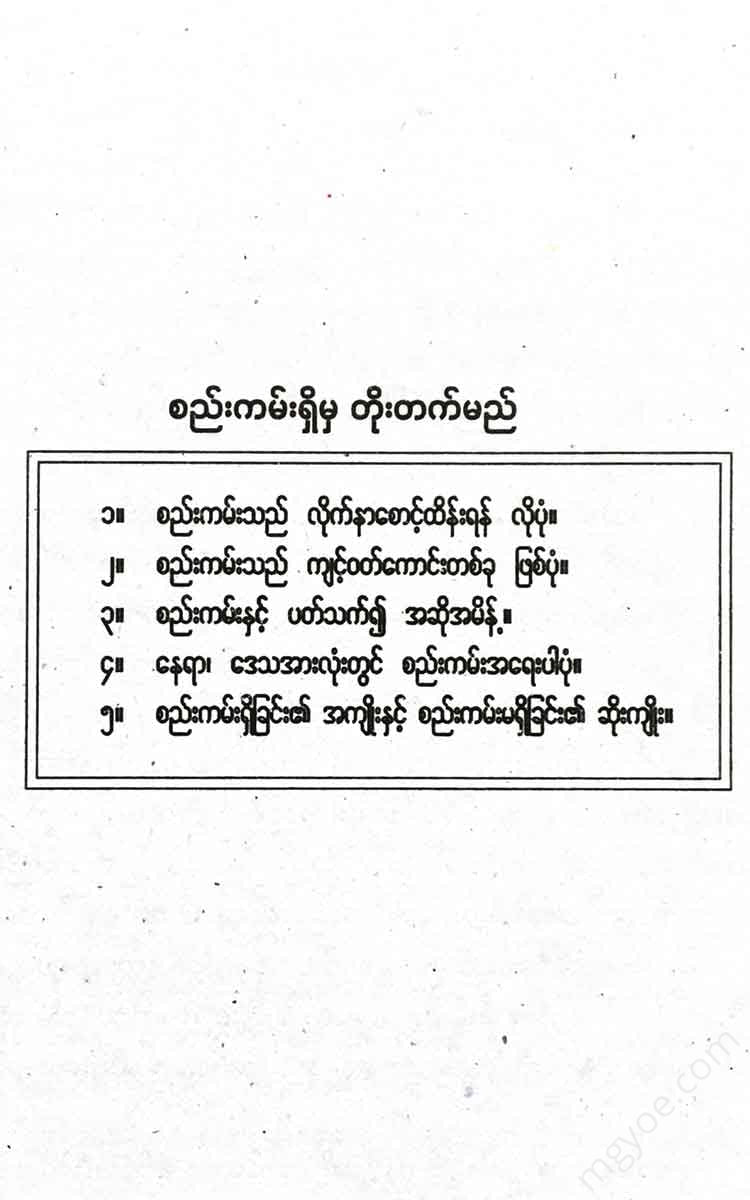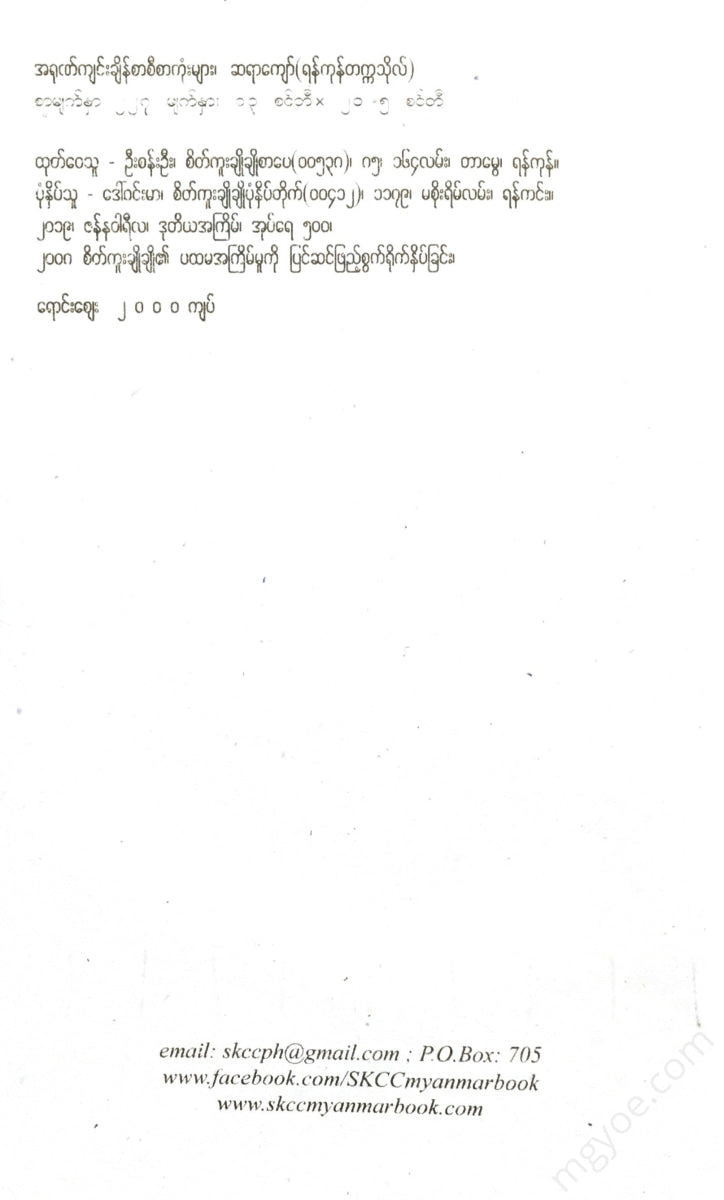စိတ်ကူးချိုချိုစာပေ
Sayar Kyaw (Yangon University) - Essays on mindfulness
Sayar Kyaw (Yangon University) - Essays on mindfulness
Couldn't load pickup availability
Progress will come only if there is discipline.
The saying “Progress comes only through discipline” is a phrase that can be seen everywhere in both the countryside and the city. This signboard is placed at the top of the road in government departments, schools, and neighborhoods. This phrase has only seven letters, but its meaning is very broad. The meaning is as broad as the benefits. Discipline is to follow
It is a code of conduct that must be observed. Discipline is very important for the development and prosperity of society. From the individual to the family, from the family to the village, from there to the city and the country, only when there is discipline can everything develop. Therefore, it is a proverb that is relevant to the present era and should be followed as a model.
If we look at the developed countries in the world today, we can see that a modern country can be built because of a good moral code called discipline. Just having discipline in one place and one group of people is not enough. Everyone needs to have discipline. Regarding discipline, the song of Saya Pe, a master of the Konbaung era, is a lesson for the Burmese people. The poem...
The Burmese have lost their throne because they broke the rules. They are running away from their father because they are being betrayed.
"They are like dogs," he said, describing how the Burmese people had fallen under the rule of others due to their lack of discipline in the past. Similarly, our father, General Aung San, in his speech at the People's Conference of the Burma Liberation Front, urged the Burmese people to be disciplined, to follow the rules, and to impress upon the people what a country would be like if it did not follow the rules.
In rural Myanmar, if you look at the village names, such as Shathaya, Shathaya Kone Village, and Pyithaya, they give their villages names that reflect the beauty of their area and make them beautiful and clean. This is the structure of a village. There is a monastery in the village. There is a pagoda. There is a village pond. Not only does it have a village hall, but there must be a village headman to govern the Shathi villagers in that village. The Shathi villagers are united. They follow the rules set for the community. The road in the middle of the village must be kept clean. The garbage in their yard is cleared. The fence of the Shathi is carefully made to protect it from wild animals and thieves. They work together for the benefit of the community. They do not smoke while walking, and the young people respect the elders. They support the young. Such human ethics, village ethics, If you follow the village rules, the village will be peaceful, pleasant, and orderly. It is not surprising that it is growing.
The good discipline of the village helps in the development of the village, and the discipline of the city is more necessary than in the rural area. The city has more houses than the rural area. The population is dense. We cannot rely on the government for the cleanliness of the city. Only by participating in our own work will our city be clean. We will be free from diseases. Only by participating in it, not by one person, but by everyone, will the cleanliness of the city be complete. We will collect garbage systematically. We will dig drainage ditches. We will make arrangements to prevent mosquitoes, flies, and rats from taking shelter. If we constantly check the ponds and water pots in every house to make sure that they are free from insects, the city will be free from diseases caused by mosquitoes, flies, and rats. If our house is clean, our roads will be clean. Only after the roads are clean, the city will be clean. In the public parks, flowers and trees are arranged to be beautiful and pleasing to the eye. Along the roads, not only shady trees but also ornamental trees are planted. This is the beauty of the city. If that beauty is destroyed, then the person will be a city dweller who is not good at it and has no discipline.
There are many examples of how the consequences of lack of discipline can be disastrous not only for an individual but also for society. A reckless driver can take many lives, or an unruly driver can cause serious injury to a person.
It is something that many people suffer from. It is not for nothing that people in the Burmese community say that discipline is the value of a person. A person who has discipline is a valuable person. A person who does not have discipline is a worthless person. People often end up falling behind in life and ending up in a bad situation.
In the field of Burmese, the word "order" has been used since ancient times. An orderly family means a family that is organized and united. "To keep the house, street, market, and school clean, we collect garbage together, wash our hands and face, and
"Healthy, clean, disease-free" is the saying. Only an orderly society can progress. There is happiness. Only a town or village with such a social community will always be beautiful because of order. Only beauty can lead to physical progress.
In short, we will be able to create a modern and developed nation where all people, from rural areas to cities, can build a disciplined society. So
I would say that if there is discipline, there will be progress.
Sayar Kyaw (Yangon University)
Thank you very much, Mom and Dad.
1. The greatness of parental kindness. 2. The five duties of parents, the five duties of children. 3. How not to offend parents and how the Buddha repays parents' kindness. 4. Examples of caring for and feeding parents. 5. Examples of personal experiences, my own views.
Thank you very much, Mom and Dad.
As the saying goes, “The blessings of parents are greater than the mountain of Myin Mo.” The blessings of parents are greater than the mountain of Myin Mo. For Buddhists, they honor and respect their parents in the same way as the Buddha, not only in terms of faith but also in Burmese tradition.
It is also about preserving a cultural tradition so that it does not disappear. Therefore, it is impossible to fully express the gratitude of parents, including Ananta, Ananta and the five elements. -
The kindness of parents is immeasurable. From the moment of conception, the mother has always loved to eat hot and spicy foods, and the love she has for her children is immense.
The car is patient and avoids. The nine-month-old baby is born "and then comes out of the womb again. It is healthy and happy to be born. It also protects the "two palms, the shoulder and the new year" from ticks, mosquitoes, and flies. No matter how hard it is, there is no fear. For parents who enjoy their children, "like a lotus in the water" is eternal joy. They are parents who are always worthy of respect and remembrance.
"Parents' filial piety is great, from the time children are young, from childhood to adulthood."
"The duties of parents are described as: "Do not be afraid of evil, guide the good, teach them skills, give them friendship, and if you marry, wear fish, and be a father and mother." Parents should always respect and honor their grateful parents. Scholars have said how much parents are happy with their children: "The appearance of their children, the name of their children, the water is clear and calm, and when they fall, they make their parents happy." According to worldly customs, there is also a proverb that says, "Only those who are good and evil are punished. There is no punishment for a bad son or daughter." Therefore, parents always love their children, whether good or bad, with a forgiving spirit. Children should not offend their parents, who are so grateful, even with their body, mouth, and heart. The five duties of children are: to provide for them, to provide for them, to make them worthy of inheritance, to give and share, to protect the family, "We should know how to repay our parents by saying, 'The five ways of life, the five ways of conduct
The Buddha preached the Abhidhamma for three months in the Tavatimsa celestial realm, and the wise men said that even though he gave birth to his mother, the child of the gods, he was not even worth a single drop of milk. For us mortals, it is far from being possible to repay the kindness of our parents. The venerable Sayadaw Khin Gyi Chak explains how we cannot repay such a great kindness to our parents.
"They always carry their mother on their right and their father on their left, on their shoulders, yet they always work and provide for them."
"The blessings bestowed upon me in the past are especially strong and cannot be repaid," he wrote.
"Those who remember their parents' kindness with special care, wherever they go, their faces are radiant and their bodies are happy. In the present cycle, they will pass their lives happily, both in body and mind. In the Buddha's discourses, there is an example of the Bodhisattva Suvannasama, who knew the kindness of his parents, being shot by an arrow and being blinded by the oath of his parents, and his blind parents also receiving the sevenfold light. Similarly, the story of the king of the raven who served his parents, and the king of the kedara who served his mother and father, is also worth noting.
According to the literature I have studied, the great love of father U Ya Kyin and mother Daw Zar Yu, who spent a lot of money to send their son Maung Thaung Pe to Bilawal during the colonial era to obtain a bachelor's degree, is a testament to the kindness of their parents. Similarly, their son
The love of his mother, Daw Za Yu, who raised him from childhood, who had endured various hardships and sacrifices for Maung Yin Maung, is also evident. In the novel by U Pho Kyar, a ninth-grade national education officer, Ma Nyunt May, the daughter of the king, Daw Khin, who suffered various hardships to become the king, Buthi Aok, who suffered various hardships until her death because her children abandoned her, did not blame her, did not envy her, and her great love for her daughter is heartbreaking. Those who have offended their parents in various ways can end their lives in misery and physical and mental misery.
Therefore, always remembering the great kindness of parents, every child should repay their parents by taking care of them in accordance with the five filial duties. The kindness of parents is immeasurable and great.


